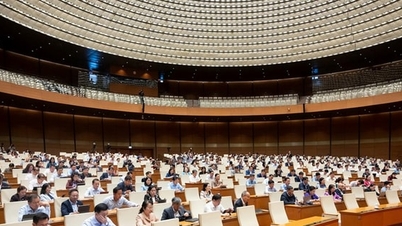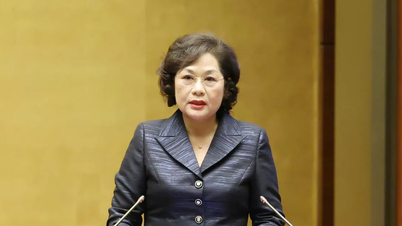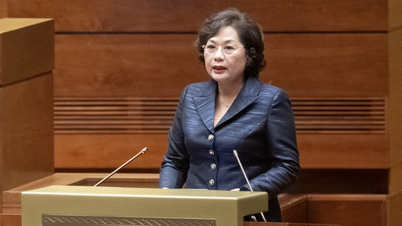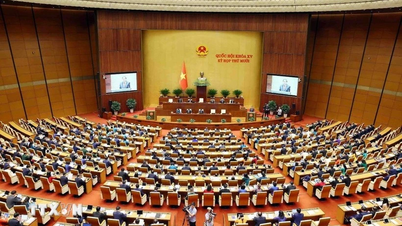In the draft submission of the Law on Deposit Insurance (amended), the State Bank (SBV) said that after 12 years of implementation, the Law on Deposit Insurance (SI), in addition to the results achieved, has arisen difficulties and problems that need to be resolved - in which the regulations on SI fees need to be amended and supplemented.
Flexible Deposit Insurance fee mechanism in each period
The draft Law on Deposit Insurance (amended) proposes: The Governor of the State Bank shall prescribe the deposit insurance premium level, the application of deposit insurance premium level at the same level or differentiating it in accordance with the characteristics of the Vietnamese credit institution system in each period. This is considered an amendment towards creating a legal basis for applying a flexible fee mechanism (at the same level or differentiating it) in accordance with the practical situation of the credit institution system in each period; at the same time, decentralizing the authority to decide on deposit insurance premiums to the Governor of the State Bank. Meanwhile, according to the provisions of the current Law on Deposit Insurance, the Prime Minister prescribes the deposit insurance premium framework; the State Bank shall prescribe specific deposit insurance premium levels for organizations participating in deposit insurance based on the results of assessment and classification of these organizations.

Illustration photo
Evaluating the proposed amendments and supplements, experts said that decentralizing the authority to regulate deposit insurance premiums to the Governor of the State Bank is consistent with the policy of promoting decentralization and delegation of power of the Party and the State; at the same time, it is consistent with the authority, functions and tasks of the State Bank. The State Bank is a state management agency with the function of inspecting and supervising the credit institution system, and the State Bank is also a state management agency for deposit insurance activities. Therefore, the State Bank has sufficient necessary basis to regulate the deposit insurance premium level and apply the same or differentiated deposit insurance premiums in accordance with the practical situation.
In addition, the regulation is flexible (the Governor of the State Bank regulates the application of deposit insurance fees of the same rank or differentiates them in accordance with the characteristics of the credit institution system in each period) based on:
Firstly, the flat fee system and the differential fee system have their own advantages and disadvantages; no fee system has absolute advantages. Accordingly, the differential fee system (credit institutions with low ratings and high risks must pay higher fees; credit institutions with high ratings and safe operations must pay lower fees) has the advantage of being consistent with market principles, encouraging credit institutions to improve their governance capacity, operate prudently and safely to pay lower deposit insurance fees. However, the differential fee system has the disadvantage that credit institutions with low ratings and more difficult financial situations must pay higher fees; therefore, this fee system can make it more difficult for low-rated credit institutions.
Second, in the context of depositors' limited awareness of the Deposit Insurance policy, the immediate application of differential fees may directly impact depositors' behavior; it may lead to the risk of depositors withdrawing money en masse from low-rated credit institutions to switch to higher-rated credit institutions (because information on ratings used to calculate deposit insurance fees is unlikely to be completely confidential). Therefore, the transition to a differential fee system needs to be carefully calculated based on market practices.
Currently, Vietnam still applies the flat deposit insurance premium mechanism (fee rate of 0.15%/year calculated on the total average deposit balance of all insured deposits at the deposit insurance participating organization). At present, the application of this deposit insurance premium mechanism is consistent with the operational practices of credit institutions in Vietnam, helping the Vietnam Deposit Insurance's operational reserve fund to grow steadily, being an important financial resource to pay insurance premiums and handle weak credit institutions.
International practice shows that the number of countries applying flat or differential premiums is quite even. According to the International Association of Deposit Insurers (IADI) 2024 annual survey, of 110 deposit insurers who responded to the question on deposit insurance premiums, 50 deposit insurers (46%) applied flat premiums, 52 deposit insurers (47%) applied differential premiums and 8 deposit insurers (7%) applied both flat and differential premiums. This balance reflects the fact that countries also carefully consider the advantages and disadvantages of each premium system before deciding to apply it in their country.
Therefore, the proposed content as in the draft Law on Deposit Insurance (amended) ensures flexibility in applying a uniform or differentiated fee mechanism suitable for each period, with the characteristics of the credit institution system in Vietnam.
Increase deposit insurance premiums to offset special loans from the State Bank
The draft Law on Deposit Insurance (amended) proposes: In case the Deposit Insurance organization borrows a special loan from the State Bank, the Deposit Insurance organization shall develop a plan to increase the Deposit Insurance premium to compensate for the special loan from the State Bank and submit it to the State Bank for consideration and decision .
At the same time, the draft Law also proposes regulations on special loans from the State Bank as follows: The Deposit Insurance Organization shall develop a plan to increase deposit insurance premiums to offset the special loans; use money to repay special loans of credit institutions, revenue from selling valuable papers held by the Deposit Insurance Organization, from liquidating assets of credit institutions with special loans, and deposit insurance premiums to prioritize repayment of special loans to the State Bank.
It is known that the above proposal was made to synchronize with the provisions of the Law on Credit Institutions 2024. In addition, according to the provisions of the draft Law, the Deposit Insurance of Vietnam only borrows specially from the State Bank when the Operational Reserve Fund is not enough to pay depositors. Thus, the fee increase is only applied in special situations, creating a basis for the Deposit Insurance of Vietnam to have more favorable conditions in financial planning, balancing capital sources; ensuring the ability to pay depositors, while also ensuring faster accumulation to repay loans from the State (State Bank).
According to experts, in principle, banking activities have a chain effect and are affected by the "domino" effect; the failure of a bank can lead to a series of withdrawals and affect the safety of other banks (even when other banks operate safely and healthily). Therefore, when the Operational Reserve Fund is not enough to pay depositors on a large scale, the remaining healthy banks are responsible for contributing additional fees to ensure the confidence of depositors; avoiding the situation of mass withdrawals at healthy banks. This ensures the principle of using market resources to handle the market's own problems, limiting the use of the state budget. This fee increase is only applied for a certain period in accordance with the plan to compensate for loans of the Deposit Insurance of Vietnam from the State Bank; it is not implemented for a long time.
According to international standards on deposit insurance, it is recommended that the emergency funding mechanism for the deposit insurance system be made public in the Law or regulations under the Law. According to the annual survey of IADI in 2024 on additional or reserve funding sources for deposit insurance organizations in case of emergency, 76/108 (70.3%) deposit insurance organizations responded that they have a mechanism to collect additional deposit insurance premiums and 16/108 (14.8%) deposit insurance organizations have a mechanism to collect deposit insurance premiums in advance.
Postpone deposit insurance premium payment
The draft Law on Deposit Insurance also proposes that credit institutions placed under special control (KSDB) are allowed to temporarily postpone the payment of underpaid deposit insurance premiums, late payments, and late payments (if any) arising before the time the credit institution is placed under special control. Credit institutions placed under special control are responsible for developing a plan to fully repay the deferred amount in the restructuring plan submitted to the competent authority for approval.
Evaluating this proposal, experts said that Clause 3, Article 166 of the Law on Credit Institutions stipulates: "Credit institutions under special control are exempted from paying deposit insurance premiums". However, current laws do not stipulate the postponement of payment of premiums in cases where credit institutions are placed under special control. In reality, situations arise where credit institutions, once placed under special control, have financial difficulties, leading to the inability to pay the deposit insurance premiums that the credit institution owed before being placed under special control. At that time, these institutions will have to bear the burden of paying deposit insurance premiums and pay fines for each day of late payment, while the credit institution does not have the financial capacity to pay the premiums.
According to experts, the regulation on postponing the payment of underpaid or late deposit insurance premiums before being placed under special control not only creates favorable conditions to support deposit insurance participating organizations to have time to restore operations, but also helps deposit insurance organizations to proactively monitor, handle and collect outstanding fees in a more reasonable manner. The postponed fee will not be erased, but the credit institution is responsible for developing a plan to fully repay the postponed amount in the restructuring plan submitted to the competent authority for approval.
Source: https://congthuong.vn/sua-doi-luat-bao-hiem-tien-gui-de-tao-co-so-phap-ly-ap-dung-co-che-phi-bao-hiem-tien-gui-linh-hoat-phu-hop-thuc-tien-he-thong-to-chuc-tin-dung-tung-thoi-ky-429286.html



![[Photo] Da Nang: Hundreds of people join hands to clean up a vital tourist route after storm No. 13](https://vphoto.vietnam.vn/thumb/1200x675/vietnam/resource/IMAGE/2025/11/07/1762491638903_image-3-1353-jpg.webp)











































































































Comment (0)